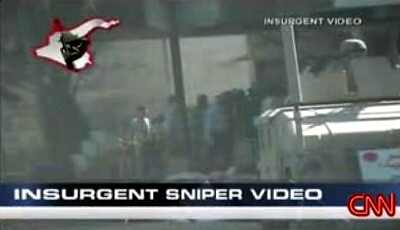al-Qaeda reportedly calls for media campaign in U.S.

WASHINGTON, Oct 27 (Reuters) - As U.S. military losses mount steadily in Iraq, a document issued by a group linked to al Qaeda spells out new goals for America's most determined enemies and calls for a media war against the United States.
The document, which began circulating on the Internet this month, illustrates the techniques Washington's enemy is using in what President George W. Bush has called the "war of ideas."
"The people of jihad need to carry out a media war parallel to the military war ... because we can observe the effect that the media have on nations," said the document, signed by Najd al-Rawi of the Global Islamic Media Front, a group associated with al Qaeda.
It lists targets for a public relations campaign ranging from the obvious -- Internet chat rooms -- to the surprising -- "famous U.S. authors with e-mail addresses" and mentions New York Times columnist Thomas Friedman and the academics Noam Chomsky, Francis Fukuyama and Samuel Huntington.
The author suggests that video of attacks on U.S. troops in Iraq could be a weapon in the media war and sway U.S. public opinion. Judging from a controversy that flared after CNN aired a video on Oct. 18 showing insurgent snipers cutting down U.S. soldiers, such footage is considered a serious threat by some U.S. lawmakers.
The tape was tame by Internet standards: the screen went black at the moment the bullets hit, sparing viewers the most shocking images.
But it prompted Duncan Hunter, the chairman of the powerful House Armed Services Committee, and two congressional colleagues to ask Defense Secretary Donald Rumsfeld to ban CNN reporters from traveling with U.S. units in Iraq.
The issue of U.S. military deaths has long been sensitive -- the Pentagon has banned photographers from taking pictures of flag-draped coffins arriving in the United States from Iraq or Afghanistan.
In the past, similar strategy messages from al Qaeda and other groups have often remained in the relative obscurity of password-protected Arabic-language Web sites and message boards.
By contrast, the call in the document for a parallel media war traveled from the Internet to a mention in a New York Times column, the White House briefing room and eventually Bush himself.
In his weekly radio address on Oct. 21, Bush specifically referred to the Global Islamic Media Front and said "the terrorists are trying to influence public opinion here in the United States. They have a sophisticated propaganda strategy ... to divide America and break our will."
Experts agree on the sophistication. "They (the jihadists) are more effective than us" on the propaganda front, said Peter Bergen, a terrorism expert at the New America Foundation, a Washington think tank.
Read the rest at Reuters/Alternet

<< Home